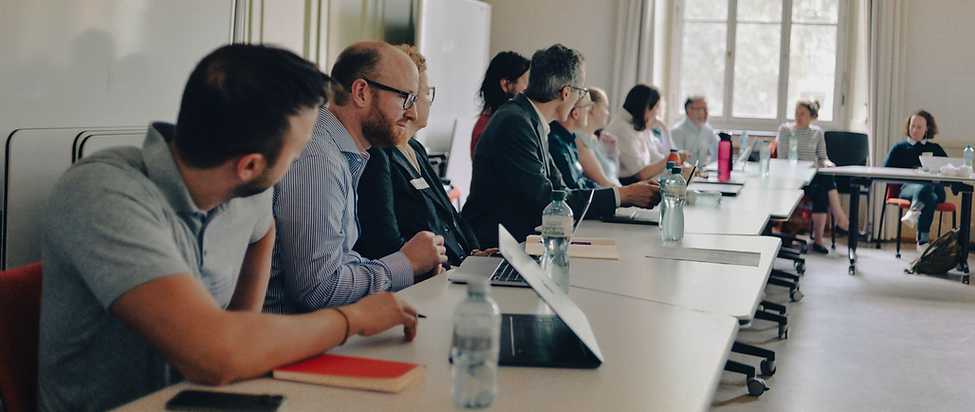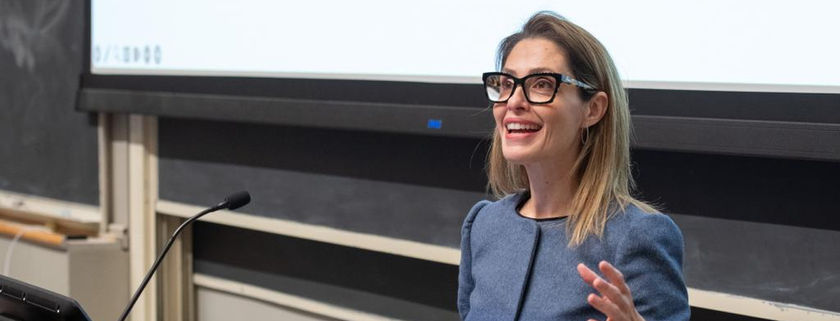
Unsere Kurse im Bereich
KI-Ethik und Governance
Upcoming
17 Dec 2025
Empowering Innovation: Thriving in the Age of AI
ETH Global Lecture Series
On Wednesday 17 December 2025, Petra Ehmann, digital shaper and ETH Alumna formerly with Google and Ringier, joins Stefano Brusoni, ETH Professor of Technology and Innovation Management and Vice Rector for Continuing Education, for a thought-provoking conversation on innovation. The event will be moderated by Chris Luebkeman from the ETH Foresight Hub.
Time: 17:30 – 18:30
Language: English
20 Jan 2026
Vision: What kind of AI do we want?
KI Kompass (previously AI Upskilling by ETH)
Artificial intelligence (AI) is more than just technology - it is reshaping our present and future. At ETH Zurich, we are at the forefront of this development. But with great innovative power comes great responsibility. This session will take you on a journey through the complex ethical and social dimensions of AI. We go beyond the code and ask: What kind of AI do we really want? Instead of just looking at the technical possibilities, we will shed light on the far-reaching effects on work, culture, education and the way we live together. Become part of a critical debate and learn how to help shape the future of AI responsibly.
Time: 12:30 – 13:30
Language: Geman
Access: ETH Members only
03 Feb 2026
AI Act: How law-abiding are AI systems currently?
KI Kompass (previously AI Upskilling by ETH)
The EU AI Act is here - the world's first comprehensive legal framework for artificial intelligence. But how well can today's AI systems, especially language models (LLMs), already comply with these new rules? Join us for an exciting session that will shed some light on the subject. We will highlight research results from ETH Zurich that show where the challenges lie - especially in areas such as robustness, fairness and transparency. Understand the gap between rapid technological progress and the important regulatory requirements.
Time: 12:30 – 13:30
Language: Geman
Access: ETH Members only

Past key events and highlights
Roundtable on Open Source AI
2025, in partnership with The AI Alliance and with the support of IBM
This roundtable aimed to foster open, safe, socially beneficial and trusted AI for growth and innovation. It brought together key stakeholders to build a shared understanding of open source AI, analyzing its challenges and opportunities. A central focus of the discussions was what policy frameworks are needed to foster open source AI, while balancing safeguards and regulations with innovation. Together, participants examined how these tensions play out in practice and worked towards concrete recommendations, including a roadmap for joint actions and a shared research agenda.

The EU AI Act in Practice: Cross-Border Perspectives on AI Governance
On November 13, 2025, Estonian Minister of Justice and Digital Affairs Liisa Pakosta joined Prof. Effy Vayena in a discussion moderated by Chris Luebkeman about how is the EU AI Act reshaping the governance of artificial intelligence across Europe. What meaningful oversight looks like in a rapidly evolving digital landscape, and how cross-border collaboration can ensure both innovation and accountability.
Bioethics in the Age of Artificial Intelligence: Navigating Opportunities, Challenges, and Responsibilities
In December, 2024, Prof. Effy Vayena gave the annual George W. Gay Lecture in Medical Ethics at the Harvard Medical School Center for Bioethics. Click here to watch the recording. More information is provided here.

Conflict-Event Prediction for UN Peacekeeping
UN-ETH Partnership and Project
On 17 May 2024, Switzerland organised an ‘Arria-formula’ meeting of the UN Security Council to explore how artificial intelligence could revolutionize UN Peacekeeping. Dr. Sascha Langenbach of the ETH Center for Security Studies (CSS) briefed the UN Security Council on the capacity of machine-learning tools to assist with information processing in UN peace operations.
This event is part of a larger joint research project between the UN Operations and Crisis Centre (UNOCC) and ETH Zurich's Center for Security Studies (CSS) that aims to explore the feasibility of an event-prediction system for UN peacekeeping. The project combines machine learning with event records collected by UN peacekeepers so as to lay the foundation for a software platform that could support data processing and decision-making procedures within UN peace missions.
The PIs of this project include Prof. Andreas Wenger (CSS), Prof. Menna El-Assady (Department of Computer Science), and Dr. Sascha Langenbach (CSS).
Read more by visiting the:
- Briefing at the UN Security Council
- UN and ETH Zurich Partnership
As If Human: Living in the Age of Intelligent Machines
On October 23, 2024, Prof. Sir Nigel Shadbolt, a leading researcher in Artificial Intelligence and Professor of Computing Science at the University of Oxford, in conversation with Prof. Dr. Margarita Boenig-Liptsin from ETH, discussed AI's history, current advancements, and the challenges and opportunities presented by today's and future AI systems.
Social Artificial Intelligence
On October 16, 2024, Prof. Nicholas Christakis from Yale University, in dialogue with Prof. Vayena, discussed the implications of integrating artificial intelligence into human social networks, focusing not on the more studied human-machine interactions, but rather asking several key questions around broader implications:
-
How might AI reshape human-human interactions and group dynamics?
-
Can our understanding of social network structure and function help assess the impact and ethical implications of social AI on human society?
-
Given the potential of 'dumb AI' to create or reinforce systemic problems, to what extent can we govern it?
-
Assuming we can address issues like nudging, manipulation, transparency, and deception, and use AI tools to encourage collective action, is this the only or the best way to foster human collaboration and coordination?
Guardrails: Guiding Human Decisions in the Age of AI
Book Talk and Panel Discussion
On June 6, 2024, Prof. Dr. Urs Gasser from TU Munich gave a talk on his book "Guardrails: Guiding Human Decisions in the Age of AI." Prof. Gasser's presentation, followed by a panel discussion, highlighted the need for human-centered "guardrails" in the digital era.
The panel featured experts including Prof. Dr. Timo Minssen (University of Copenhagen), Jeremy Rollison (Microsoft), Lukas Walker and Dr. Sara Kijewski (ETH Zurich), moderated by Prof. Dr. Effy Vayena (ETH Zurich). The discussion emphasized the importance of balancing technology with human values to create a more equitable society.

With Prof. Dr. Urs Gasser (TU Munich)

Featuring Prof. Dr. Timo Minssen (University of Copenhagen), Jeremy Rollison (Microsoft), Lukas Walker (ETH Zurich) and Dr. Sara Kijewski (ETH Zurich)

Featuring Prof. Dr. Urs Gasser (TU Munich), Prof. Dr. Timo Minssen (University of Copenhagen), Jeremy Rollison (Microsoft), Lukas Walker (ETH Zurich) and Dr. Sara Kijewski (ETH Zurich)

With Prof. Dr. Urs Gasser (TU Munich)

